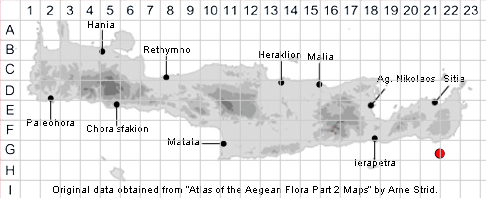
SPECIES DESCRIPTION
SUAEDA PALAESTINA
Family and Genus:- See- AMARANTHACEAE
Common Names:- None
Homotypic Synonyms:- None
Meaning:- Suaeda (L) From the Arabic, suwed-mullah, for Suaeda baccata.
Palaestina (L) From Palestine, Palestinian.
General description:- Small hairless shrub.
Stem:-
1) Up to 120 cm.
Leaves:-
1) 5-18 x (0·8-)1-2·5 mm. semi-terete, (± flattened on the upper side) arcuate.
apiculate, sessile, glaucous.
Flowers:-
1) Solitary, shorter than the bracts.
1) Stigmas, 0·2-0·4 mm, connate at the base, flat, lobed, forming a complex peltate
capitate, structure.
2) Fruiting perianth, not inflated, usually green.
Fruit:-
1) Seeds, smooth, usually vertical.
Key features:-
1) Leaves, and bracts, arcuate.
2) Flowers, solitary.
Habitat:- Coastal habitats and open grassy areas close to the coast. 0-50 m.
Distribution:- Within the Aegean area known only from a single collection from the
small island of Koufonisi off SE Crete. A mainly native species occurring from
Palestine along the S Mediterranean shores to Tunisia.
Flowering time:- May.
Photos by:- Ralf Jahn
